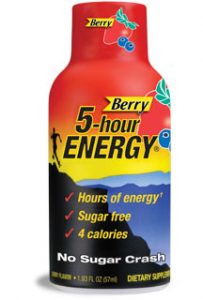5-Hour Energy Lawsuit: Defense Spins a Good One!
January 25th, 2017. By LucyC
 5-Hour Energy? Maybe, maybe not. The energy drink maker is the subject of multidistrict litigation (MDL) alleging consumer fraud, who would have thought? I know, I know. The gripe is that the energy boost ain’t all it’s cracked up to be, and that consumers swallowed the advertising in good faith (sorry, couldn’t resist).
5-Hour Energy? Maybe, maybe not. The energy drink maker is the subject of multidistrict litigation (MDL) alleging consumer fraud, who would have thought? I know, I know. The gripe is that the energy boost ain’t all it’s cracked up to be, and that consumers swallowed the advertising in good faith (sorry, couldn’t resist).
The consolidated complaint was filed in January 2014. It claims that 5-Hour Energy states the drink gives long-lasting energy that “doesn’t jack you up with sugar, caffeine and herbal supplements.” The claim goes on, “defendants admit that the product provides no caloric energy at all.” So where does the energy come from then?
Read on…
Lawyers for the defendant and the plaintiffs recently sat down with the presiding judge to try and work this thing out. Lawyers for 5-Hour claim that it would be impossible for consumers to be deceived about the effects of the product they have purchased hundreds of times. The argument apparently followed the lines of 5-Hour Energy being an “experiential product”. Translation: you have an “experience” drinking 5-Hour Energy that may or may not be like the experience it claims you’re going to have. The consumer knows what that feeling is regardless and continues to buy the product, so they cannot reasonably claim they are being deceived or have made an uninformed choice. Have I got that right?
“Whether it gives them a crash, or whether it gives them energy now or whether it gives them five hours of energy, they know what the product does for them now, having bought it, in some cases hundreds and even thousands of times,” an attorney for 5-Hour Energy said. Thousands of times?
Not surprisingly, the judge was skeptical, saying that, essentially it doesn’t matter how many times you buy a product—that every product claim is potentially enough to go to court with when you realize you’re being defrauded.
According to the plaintiffs, 5-Hour Energy claims that its effectiveness results from the B vitamins and amino acids in the drink. BUT—wait for it—the drink’s effects are due to the fact that each one contains more than 200 milligrams of caffeine, which the plaintiffs claim is more than the amount in an extra-strength caffeine pill or multiple cups of coffee. Flashback: How healthy is this? Just asking…
The 5-Hour Energy lawsuit sought to establish a nationwide class with subclasses for purchasers of a decaffeinated version of the product (what would be the point of a decaffeinated drink?); purchasers of four, six or 12 multipacks; and consumers in different states, including New York, California, Pennsylvania, Louisiana, Ohio, Illinois, Georgia, New Mexico, New Jersey, Missouri, Indiana and Florida. Talk about covering your bases.
While the judge has previously dismissed in large part the plaintiff’s allegations, he has upheld the consumer fraud allegations over the 5-Hour Energy labeling claims. And reportedly, he has taken the entire motion under submission. So we shall see. I think you could need something like 5-Hour Energy just to get through the hearings.
The case is In Re: 5-Hour Energy Marketing and Sales Practices Litigation, Case Number 2:13-ml-02438 in the U.S. District Court for the Central District of California.
Archive by Category
- Accidents (24)
- Airlines (9)
- Asbestos Mesothelioma (262)
- Automotive (25)
- Celebrity (14)
- Class Action (84)
- Complaints/Comments (15)
- Consumer Fraud (84)
- Contest (2)
- Court of Public Opinion (5)
- Crazy Sh*t Lawyers See (61)
- Criminal Law (4)
- Defective Products (111)
- DePuy ASR Hip Recall (2)
- Discrimination (22)
- Drugs/Medical (248)
- Elder Care Abuse (4)
- Emerging Issues (462)
- Employment (54)
- Environment (52)
- Financial (28)
- Food Illness (15)
- Human/Civil Rights (4)
- Insecurities (5)
- Insurance (16)
- Intellectual Property (16)
- Internet/E-commerce (19)
- lawsuits (161)
- Lawyers (20)
- Lawyers Giving Back (43)
- Lex Levity (10)
- Personal Injury (106)
- Pleading Ignorance (53)
- Real Estate (2)
- Recall (6)
- Scam (3)
- Securities (13)
- Settlement (81)
- Tort Reform (2)
- Totally Tortelicious (81)
- Veterans (11)
- Whistleblower (9)
It says that it’s ultra sugar
I believe it was false advertising!
I tried it one time and I was buzzed for 16 hours I tried it two more times and nothing so i think its all a rues to get you to buy something. I work nights and needed a little extra pep that one night and with no sleep i think it was all in my mind anyway Who knows with that much caffeine that cant be good for one anyway its not good for ones heart.
Man, this got me through law school.